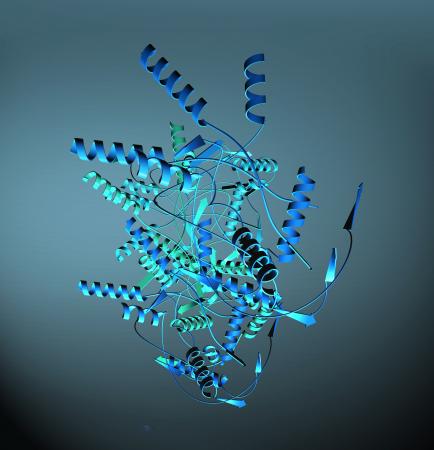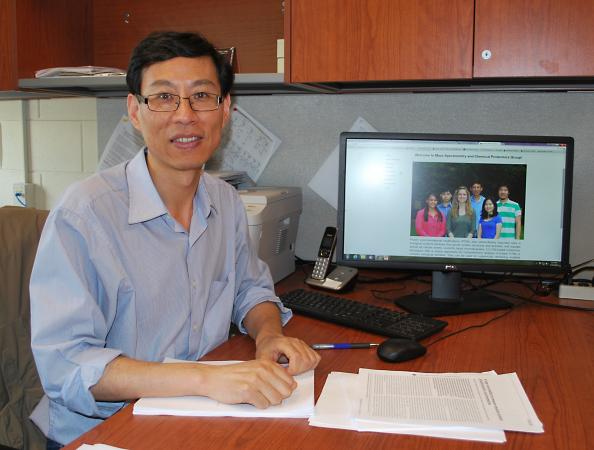The analytical chemistry technique known as mass spectrometry (MS) is playing an increasingly important role in biomedical research, and few researchers know this better than Ronghu Wu, assistant professor in the School of Chemistry and Biochemistry and a faculty member of the Petit Institute of Bioengineering and Bioscience.
Wu and his group have been implementing the technique for proteomics research. Since coming to Georgia Tech in 2012, the Wu lab has published several important research papers focused on aspects of MS and MS-based proteomics. And recently, the Wu lab was given a critical boost for its groundbreaking research thanks to a CAREER Award from the National Science Foundation.
Wu’s CAREER project, “Characterizing the Glycoproteome with Effective MS-based Chemical and Enzymatic Methods,” is receiving $625,000 over five years from the NSF. The glyproteome includes all proteins bearing carbohydrates, and glycosylation is one of the most common and essential protein modifications.
“This CAREER Award research is mainly about developing new methods to globally analyze glycoproteins in complex biological samples,” says Wu, whose lab is known for its innovative MS-based proteomics techniques, and for applying them to biomedical research.
“It is well known that aberrant protein glycosylation is directly related to disease, including cancer and infectious diseases,” he continues. “However, a huge gap exists between glycoproteins in complex samples and glycoproteins that can be identified by current methods. There is an urgent need to develop effective methods for the comprehensive identification and quantification of glycoproteins. This research can help us better understand protein function and the molecular mechanisms of disease, which will lead to the discovery of glycoproteins as effective biomarkers and drug targets.”
In addition to the award, another research paper from the prolifically published Wu lab has been accepted for publication in Chemical Science. The article entitled “Systematic and site-specific analysis of N-sialoglycosylated proteins on the cell surface by integrating click chemistry and MS-based proteomics,” co-authored by Weixuan Chen and Johanna M. Smeekens and Wu has received some enthusiastic feedback from reviewers, who have noted, “this is a nice and very solid proteomics study on the metabolic labeling and localisation of sialic acid expression on glycoproteins at the cell surface,” according to Wu.
Furthermore, Wu adds, “Sialic acid modification is a very active topic due to its importance as a cell surface marker and up-regulation in cancer cells, as well as a handle used by pathogens to bind to the host cells in several human viral infections (influenza, adenoviruses). This work is particularly significant because it combines a novel chemoselective tagging approach that is compatible with imaging in live cells, and an enrichment protocol for profiling glycoproteins by mass spectrometry.”
This is just the latest in a flurry of research papers published by the busy trio – post-doctoral research fellow Chen, Ph.D. student Smeekens, and Wu. Earlier this year they were published in the journal Analytical Methods as well as Journal of Proteome Research (with co-authors from the Wu lab, graduate student Haopeng Xiao and undergrad George X. Tang).
After being published online in Chemical Science, their latest this paper was highlighted in Chemical & Engineering News, whose editors wrote, “Sialic acid-containing glycoproteins are important players in cancer metastasis and viral infections, yet there hasn’t been a method for their complete analysis on cell surfaces. To address that problem, Ronghu Wu and coworkers at Georgia Institute of Technology have developed a method that combines metabolic labeling, chemical modification, and mass spectrometric proteomics.”
And this is just the latest in a flurry of research papers published by the busy trio of post-doctoral research fellow Chen, Ph.D. student Smeekens, and Wu. Earlier this year they published papers in Analytical Methods, Journal of the American Society for Mass Spectrometry, as well as Journal of Proteome Research (with co-authors from the Wu lab, graduate student Haopeng Xiao and undergrad George X. Tang).
LINKS:
Chemical & Engineering News highlight
CONTACT:
Jerry Grillo
Communications Officer II
Parker H. Petit Institute for
Bioengineering and Bioscience
Media Contact
Jerry Grillo
Communications Officer II
Parker H. Petit Institute for
Bioengineering and Bioscience
Keywords
Latest BME News
Jo honored for his impact on science and mentorship
The department rises to the top in biomedical engineering programs for undergraduate education.
Commercialization program in Coulter BME announces project teams who will receive support to get their research to market.
Courses in the Wallace H. Coulter Department of Biomedical Engineering are being reformatted to incorporate AI and machine learning so students are prepared for a data-driven biotech sector.
Influenced by her mother's journey in engineering, Sriya Surapaneni hopes to inspire other young women in the field.
Coulter BME Professor Earns Tenure, Eyes Future of Innovation in Health and Medicine
The grant will fund the development of cutting-edge technology that could detect colorectal cancer through a simple breath test
The surgical support device landed Coulter BME its 4th consecutive win for the College of Engineering competition.









